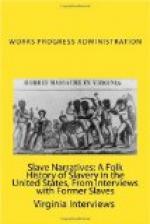“I do not recall of seeing slaves sold nor did the man who owned our family buy or sell slaves. He was a small man.
“As to the farm, I do not know the size, but I know it was small. On the farm there was no jail, or punishment inflicted on Pap or Ma while they were there.
“There was no church on the farm, but we were members of the old side Methodist church, having a colored preacher. The church was a long ways from the farm.
“My father neglected his own education as well as his children. He could not read himself. He did not teach any of his children to read, of which we in later years saw the advantage.
“In Carroll County there were so many people who were Union men that it was dangerous for whites in some places to say they were Rebels. This made the colored and white people very friendly.
“Pap was given holidays when he wanted. I do not know whether he worked on Saturdays or not. On Sunday we went to church.
“My father was owned by a man by the name of Mr. Dorsey. My mother was bound out by Mr. Dorsey to a man by the name of Mr. Morris of Frederick County.
“I have never heard of many ghost stories. But I believe once, a conductor on the railroad train was killed and headed (beheaded), and after that, a ghost would appear on the spot where he was killed. Many people in the neighborhood saw him and people on the train often saw him when the train passed the spot where he was killed.
“So far as being sick, we did not have any doctors. The poor white could not afford to hire one, and the colored doctored themselves with herbs, teas and salves made by themselves.”
Maryland [—] 11, 1938 Rogers
Caroline Hammond, A fugitive.
Interview at her home, 4710 Falls Road, Baltimore,
Md.
“I was born in Anne Arundel County near Davidsonville about 3 miles from South River in the year 1844. The daughter of a free man and a slave woman, who was owned by Thomas Davidson, a slave owner and farmer of Anne Arundel. He had a large farm and about 25 slaves on his farm all of whom lived in small huts with the exception of several of the household help who ate and slept in the manor house. My mother being one of the household slaves, enjoyed certain privileges that the farm slaves did not. She was the head cook of Mr. Davidson’s household.
“Mr. Davidson and his family were considered people of high social standing in Annapolis and the people in the county. Mr. Davidson entertained on a large scale, especially many of the officers of the Naval Academy at Annapolis and his friends from Baltimore. Mrs. Davidson’s dishes were considered the finest, and to receive an invitation from the Davidsons meant that you would enjoy Maryland’s finest terrapin and chicken besides the best wine and champagne on the market.
“All of the cooking was supervised by mother, and the table was waited on by Uncle Billie, dressed in a uniform, decorated with brass buttons, braid and a fancy Test, his hands incased in white gloves. I can see him now, standing at the door, after he had rung the bell. When the family and guests came in he took his position behind Mr. Davidson ready to serve or to pass the plates, after they had been decorated with meats, fowl or whatever was to be eaten by the family or guest.




